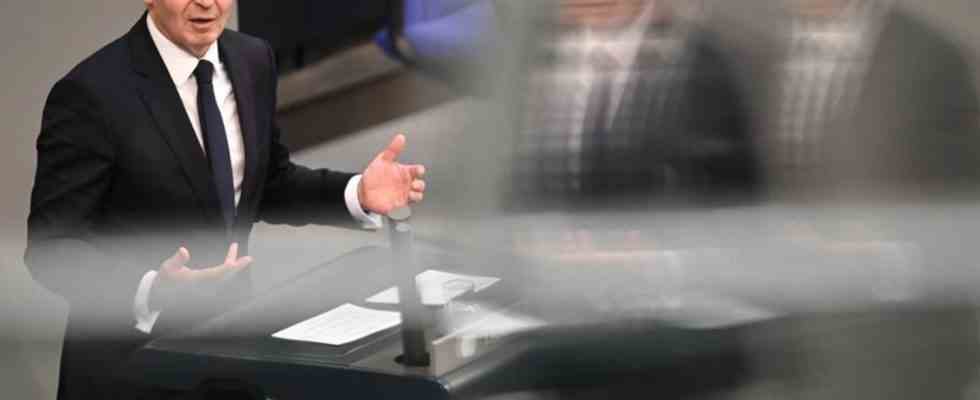Actually, the extensive end of combustion engines from 2035 in the EU should have been decided long ago. But Transport Minister Wissing stopped the project in the last few meters. Heavy criticism comes from Brussels.
The ongoing German blockade of the planned end for new combustion engines from 2035 is met with incomprehension and horror among European partners. EU diplomats in Brussels speak of a breach of trust and criticize the government’s disagreement in Berlin. The leadership of Chancellor Olaf Scholz (SPD) is also being questioned and comparisons with Viktor Orban’s Hungarian government are being made.
“We think it’s a breach of trust,” says a diplomat from the German Press Agency about the German approach. The negotiations took place in the usual manner, objections could have been raised earlier – and German concerns were taken into account. “One would wish that the coalition’s internal disputes would be resolved beforehand.”
In the future, one will always ask oneself “what an agreement with Germany is worth at all”. Perhaps other countries would also come up with the idea of behaving in the same way. Her conclusion: “This is all extremely questionable.”
Usually a formality
Because it should actually have been decided since Tuesday what politicians, car manufacturers and other observers had been assuming for months anyway: that in the EU from 2035 only new cars may be sold that do not emit any greenhouse gases during operation. Negotiators from the European Parliament and the EU states had already agreed on this in October. In November, the permanent representatives of the member states confirmed the outcome of the negotiations with German approval, and the European Parliament approved it in mid-February.
The very last step in the long legislative process was planned for last Tuesday: the final approval of the EU states – a formality that normally does not require debate.
Because there were already enough opportunities to bring in your own wishes, as several diplomats emphasize. In the summer, for example, when the EU countries coordinated their negotiating position. Or later, when talks with Parliament were underway. But now to register concerns – “that’s pretty unusual,” says an EU diplomat. The other countries were very surprised, says another diplomat. Other representatives of member states in Brussels are far less diplomatic about the approach, which the FDP in particular is accused of.
E-fuels issue
Because it was only at the end of February, about a week before the planned vote, that FDP Transport Minister Volker Wissing suddenly expressed concerns via “Bild” – and threatened in the newspaper not to agree to the result after months of negotiations. Since then, Wissing and FDP leader Christian Lindner have repeatedly emphasized that the EU Commission must submit a proposal as to how new private cars that use climate-neutral, synthetic fuels, so-called e-fuels, can still be registered after 2035.
Above all, the FDP argues that all technological options must be kept open for climate-neutral mobility. With e-fuels, combustion engines can theoretically be operated in a climate-friendly manner, but their production is relatively energy-intensive.
Under pressure from the FDP, the federal government had already negotiated an amendment to the planned law in the summer of 2022, according to which the EU Commission should submit a proposal for CO2-neutral fuels. However, the Brussels authorities are of the opinion that this cannot be aimed at private cars, but only at special vehicles such as fire engines. And so the federal government is currently blocking the law that has already been negotiated – together with Poland, Italy and Bulgaria. The vote has been postponed indefinitely.
Is Germany a reliable partner?
The traffic light coalition itself does not agree on this. The FDP and SPD Chancellor Scholz see the commission on the train. The Green-led Ministry of the Environment, on the other hand, criticizes the blockade of the Ministry of Transport. Minister Steffi Lemke warns: “Germany should remain a reliable partner among EU partners.”
But the damage has long been done. Spain’s Deputy Prime Minister Teresa Ribera recently warned of scenarios in which other governments could take similar action on other issues. Another EU diplomat says such behavior is expected from the Hungarian government under Viktor Orban, but that Germany has a special responsibility in the EU.
Former Chancellor Angela Merkel understood that a well-functioning EU was in the best interest of Germany as the largest member and the largest economy. “Scholz has not yet understood this and seems to be acting more as a national minister than as Chancellor,” emphasizes the diplomat. In view of the global situation, however, Germany cannot afford to pursue a “narrow-minded national approach in the EU”.
Traffic light has a divided effect on Brussels
The diplomat also points out that it is not the first time that the traffic light government in Brussels has been perceived as divided. He mentions, for example, the negotiations on better working conditions for platform workers, in which the EU states were recently unable to determine a position because the traffic light did not find a line.
A senior EU diplomat said earlier this year that Germany is the only country that can afford to represent three positions on the same issue at the same time – depending on which party you are talking to.
Communication from the Council of EU states on the agreement with the European Parliament (October 27th, 2022) Text of the agreement between the European Parliament and EU states

